If your pup cannot poop as he normally should, it becomes a worrisome situation for both of you. But how do you make your puppy poop when he is having a hard time doing so?
Normally, healthy newborn puppies defecate every hour, and older ones should relieve themselves two to three times a day. However, because a newborn pup has not yet learned how to control his bowel movement and older dogs can easily get constipated, they might need your help with bowel elimination.

Amazon Brand - Wag Probiotic Supplement Daily Chews for Dogs, Supports Digestion and Gut Health, Natural Duck Flavor, 90 count
View on Amazon
Purina Pro Plan Veterinary Supplements FortiFlora Chewable Dog Probiotic Supplement Tablets - 45 ct. Canister
View on Amazon
Weruva Pumpkin Patch Up!, Pumpkin Puree Pet Food Supplement for Dogs & Cats, 2.80oz Pouch (Pack of 12)
View on AmazonWhy is it Important for my Puppy to Poop Regularly?
When bowel elimination is delayed, solid waste stays in the colon for too long. Its moisture content is re-absorbed by the body. This results in “constipation.”
If your pet is constipated, he starts feeling uncomfortable. He may strain ineffectively for hours and eventually exhibit symptoms such as a change of behavior, general weakness, loss of appetite, bloating, and pain. Some inflammation and bloody or mucosal anal discharge may also be observed.
To prevent constipation as responsible pet owners, it is vital that you learn some tips on how to stimulate a young pup to defecate. If you notice the early onset of the problem and the reasons behind it, you can readily address it through dietary changes for your dog or other home remedies.
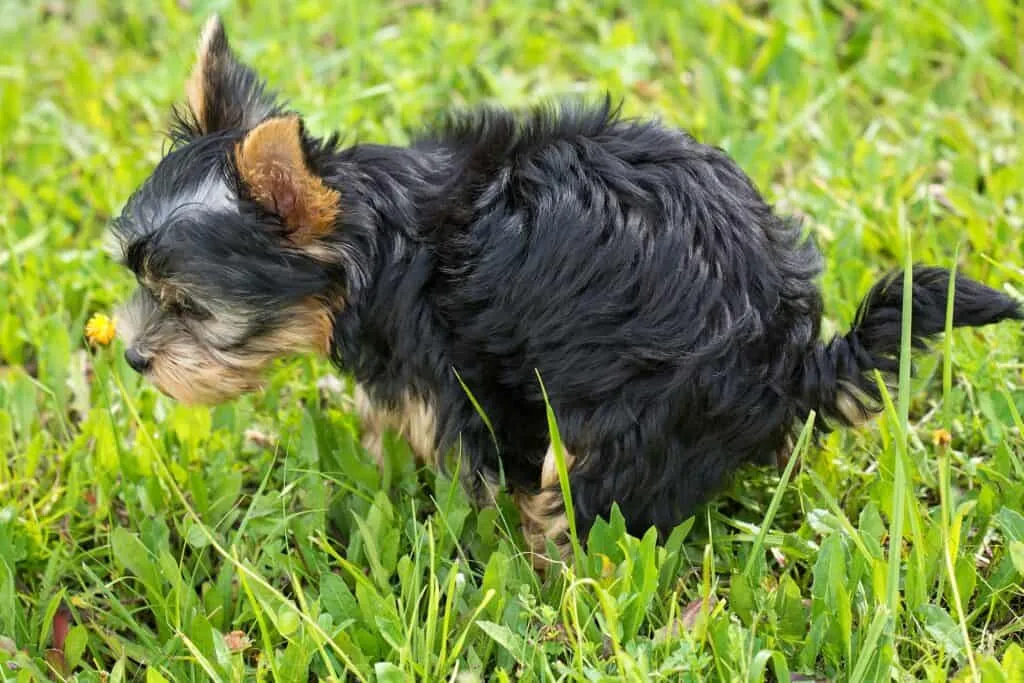
Why is my Puppy not Pooping
A dog may get constipated for several reasons, from the basic to the unexpected. Depending on the cause, appropriate measures should be undertaken.
Diet-Related and Dehydration
A puppy’s diet greatly affects his bowel movement. Food with insufficient fiber will produce smaller, denser dog stools that are difficult to pass.
Other diet-related factors that affect your dog’s digestive processes include sudden dietary changes and highly processed dog treats, and other dog consumable products with very little fiber.
Lack of clean freshwater can also lead to dehydration and constipation. That is why it is important to watch out for dry and hard stools that your dog finds hard to expel.
Before you start giving your pup more liquid, be certain that dehydration is the underlying cause. Otherwise, this will prove futile or even generate another concern if there is another problem.
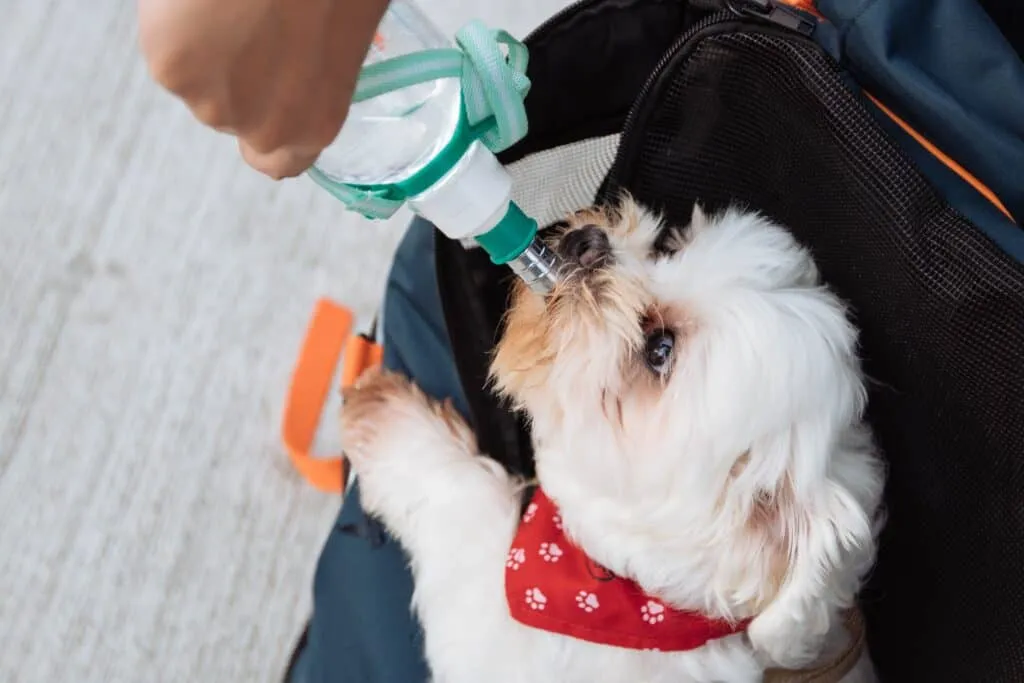
Lack of Adequate Exercise and Stress
Inactivity slows down the digestive system, which can lead to constipation. Allowing your puppy to sit around all day raises the risk of poor digestion.
Also, if you are housebreaking or crate training your pup and he does not potty while you are out, he may try to hold it in for a period of time. This results in the colon slowing down and the feces getting harder to pass.
In addition, dogs are very susceptible to emotional distress. Bringing a new puppy home exposes him to a new environment. He may suffer from too much stress after bringing your dog home. Stress causes increased muscle tension in your dog, which inhibits the smooth passing of waste. The excess waste then causes a build-up in the colon and further compounds constipation.
In most cases, this situation will resolve on its own as your puppy adjusts to his current circumstances. But, if constipation persists beyond two days, consider bringing your dog to see a vet.
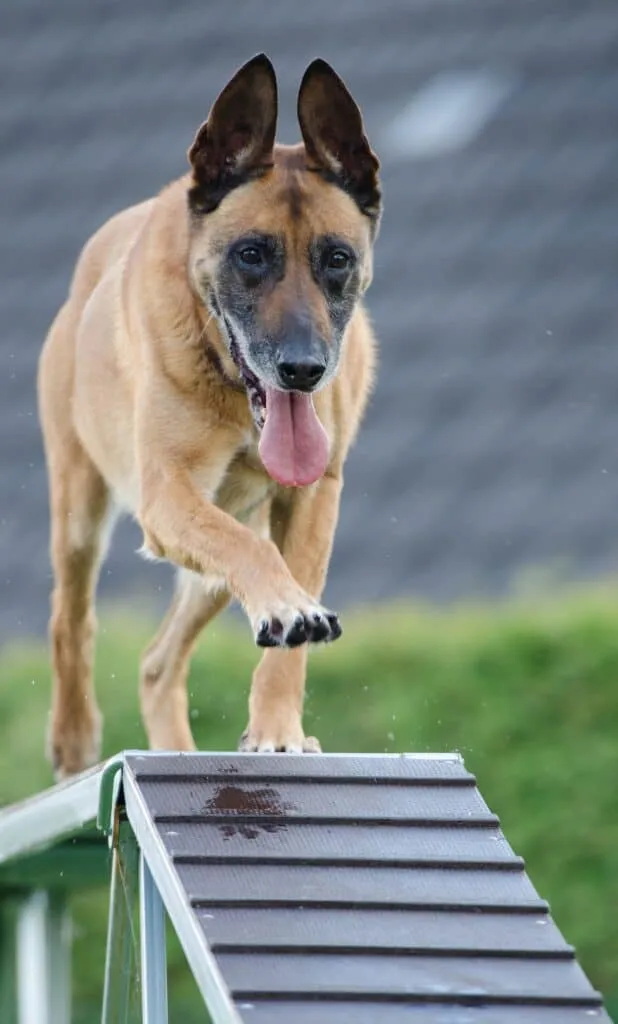
Medications, Surgery, and Medical Conditions
Certain canine medications have caused constipation as a side effect. These include those used to treat diarrhea that slows the intestinal tract, antihistamines for allergies, and opioids for pain.
If you think a specific medication is causing your puppy’s constipation, immediately cease administration and consult your veterinarian.
It is also necessary that before you give him any drug, even over-the-counter ones, you should clarify the possible adverse effects with your vet first.
Effects of anesthesia administered during surgery and lack of activity during recovery slow down your puppy’s digestive system. A spay, neuter surgery, or treatment for a traumatic injury may contribute to this case.
Back, hip, or abdominal pain from recent surgeries are some of the things that may also deter your dog from posturing to defecate. Also, diseases like neuromuscular disorders involving nerve damage to the colon, hypothyroidism, hypercalcemia, and the like can affect digestion, leading to constipation.
Kidney disease causes too much water to be absorbed from the stool, leaving it dry and hard. Tumors, hernias, anatomical defects in the colon or rectum, and infections, to name a few, create obstructions that affect the passing of waste out of the body. It makes them frequently strain in attempts to defecate, so it is often confused with constipation.
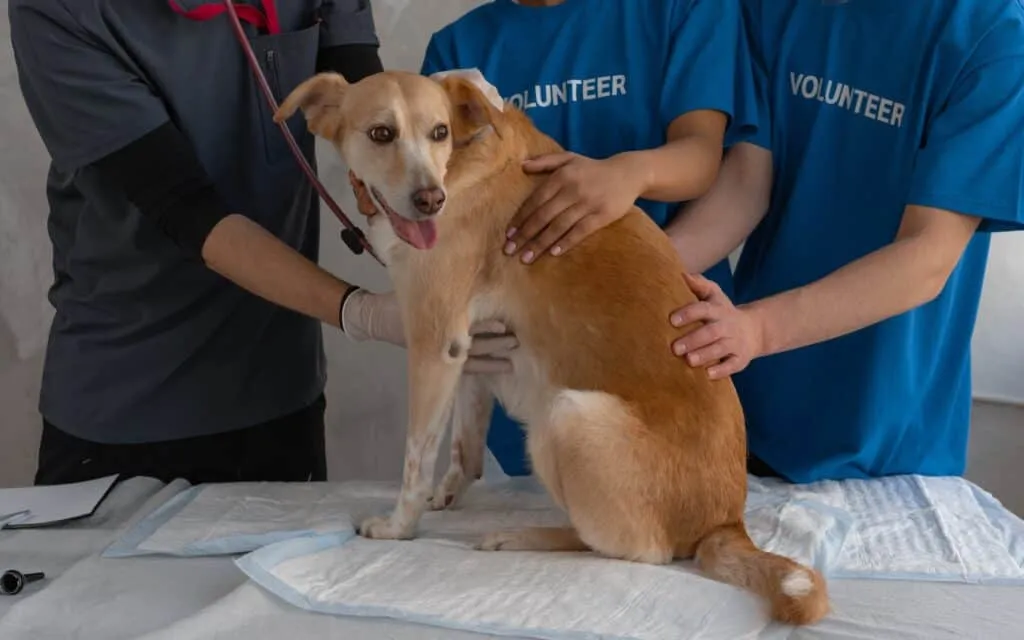
Colon Obstruction, Parasites, and Grooming Issues
An instinctively curious puppy will eat almost anything he can get his mouth into. This includes clothing, plastic bags, small toys, grass, and many others. When ingested, these can puncture and obstruct your dog’s large intestine, causing a slowdown in his stool movement. In worse cases, partial or complete colon blockage can lead to a buildup of waste or fecal impaction and infection.
There are also times when intestinal parasites such as worms can cause constipation in your pet. It is common for puppies to have worms, which should be considered a potential cause for abnormal defecation. If such is the case, worms must be treated properly.
Finally, poor grooming, especially for long-haired puppies, could also cause constipation. Puppies that tend to lick themselves a lot can swallow a lot of furs that form into balls and cause colon obstruction. Puppies will struggle to defecate in attempts to pass these foreign objects.
‘Mechanical Constipation’ or ‘Psuedoconstipation’ is another form of colon obstruction caused by a dog’s hair around his anus getting tangled or matted, resulting in an external blockage that interferes with normal defecation. If it worsens, the hair can prevent bowel motility and lead to anal inflammation and painful elimination.

How To Make A Puppy Poop
You are not totally helpless when you see your dog in elimination distress. You can resort to a few remedies to stimulate your pups to do their thing. To ensure effectiveness, constipation treatment must address the specific cause.
Here are some of the things you can do to help your dog.
Get him Close to His Mom
Did you know that our pets have a natural way of stimulating their young pups to eliminate their waste? Naturally occurring in the animal world, the mother dog licks the genital and anal areas of her newborn puppies to help stimulate their elimination reflex. Bringing the pups closer to their mom would encourage the mom to do her thing to help her puppies poop.
But, when mothers are missing or incapable of doing so, paw parents must then take responsibility for maintaining the welfare and ensuring the proper development of these puppies.
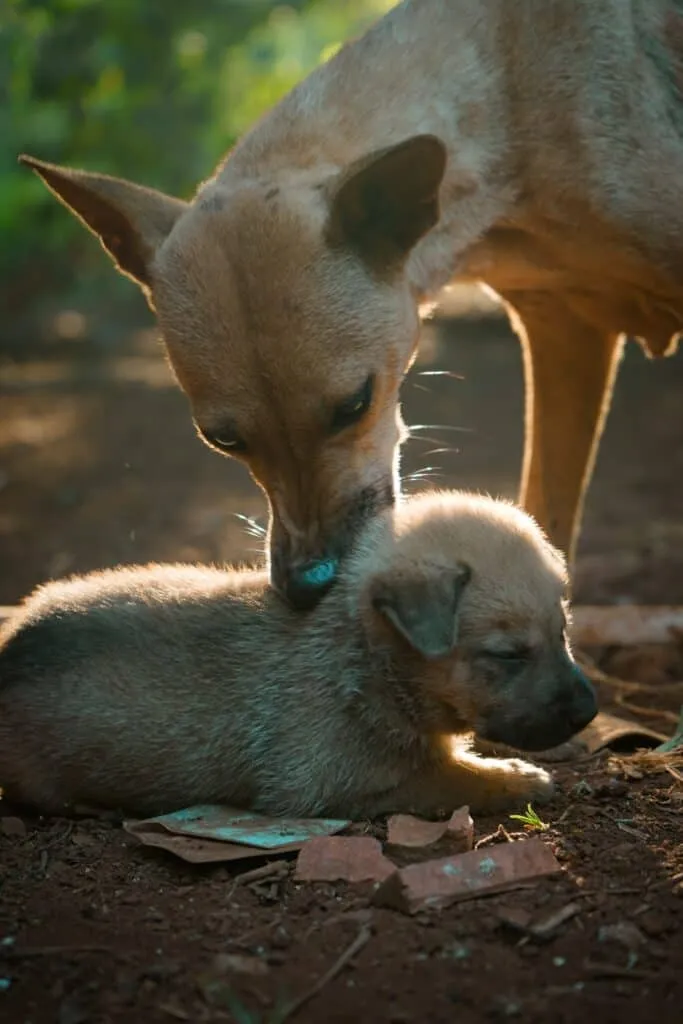
Adequate Fluid Intake
Make sure that your puppy stays hydrated and drinks enough water. It will help moisten his food and lubricate his digestive tract for easy passage. He needs access to fresh water at all times during the day.
Aim for a daily minimum of about one ounce of liquid per pound of body weight. Increase this appropriately if the weather is hot or if he is very active.
If you cannot get him to drink adequately, just add warm water to his dry food or mix wet and dry dog food to get more fluids into him. This can help mitigate the severity of constipation.
Dairy Milk
Another option that could help is milk. Dogs cannot digest lactose properly. That is why in normal circumstances, it causes diarrhea. But this effect is exactly what you need for bowel motility.
Just ensure not to offer him too much. Otherwise, he might suffer from loose bowel movements.
Dietary Fiber
Your puppy’s dietary intake greatly affects his digestion and elimination. Fiber, particularly insoluble fiber, can ease the movement of digestion through the intestines. Foods that are rich in healthy fiber can help support your dog’s digestive system, aiding in the prevention of constipation.
Pumpkin is a great source of fiber and is high in water content which can bulk up and loosen the stool. Giving your dog some pumpkin treats would help him have better stools.
Increase His Exercise
Lack of exercise may also be one of the reasons for your puppy’s constipation. Keep your dog more active to increase blood flow in the colon. Establish a regular exercise regimen to keep everything running smoothly.
Daily long walks and increasing his playtime and training sessions would help. It will also allow him to stay outside longer, which gives him plenty of opportunities to eliminate.
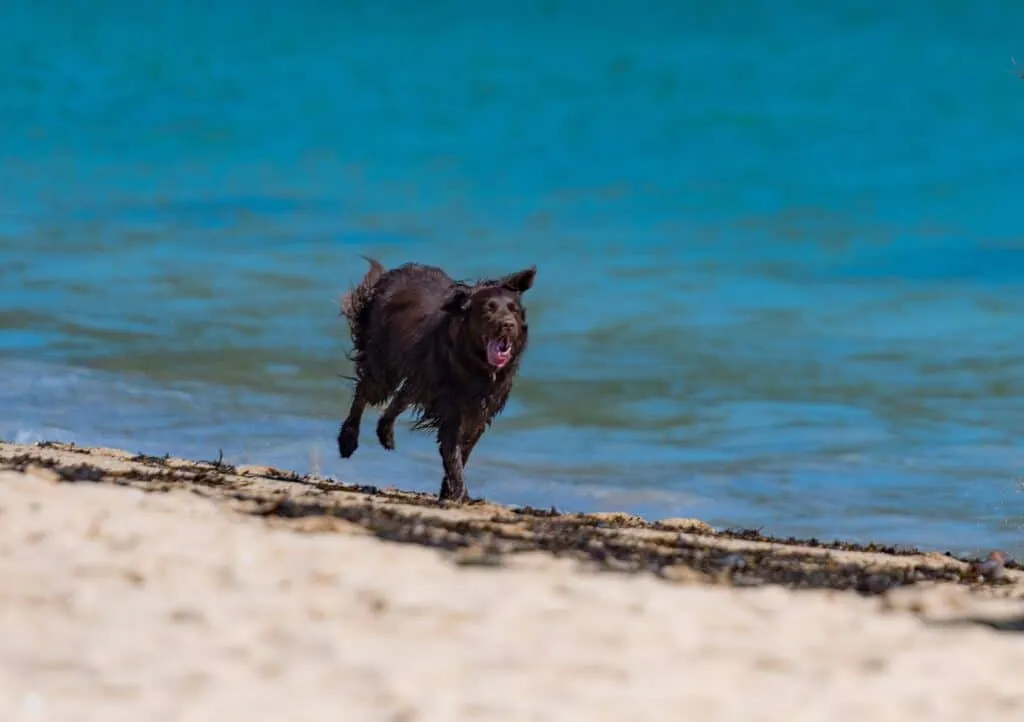
Proper Grooming
Basic pet care requires proper grooming.
Check if the area around your puppy’s anus is cramped with long hair that can cause “mechanical constipation.” Using a small pair of scissors, trim the dog’s hair. Be extra careful not to cause injury to the skin. Maintaining his fur short enough should prevent a recurrence and keep his rear end clean.
Improve on Potty Training
Another important factor is how you potty train your puppy. Brush up on your approach, as it may be the cause of the problem.
Your puppy might be uncomfortable relieving himself in an unconducive environment. Choose a quiet place with little distraction and establish it as his habitual toilet spot.
You may also want to stay outside longer with him to explore a safe and familiar area. Use a command like “Go poop” or “Potty” to tell him it is potty time.
Synchronize Your Schedule
Simple changes in your own routine, such as adjusting to your puppy’s natural elimination schedule, can train his body clock to establish a habit. To prevent delays, work out a schedule where you are around whenever your dog needs to go outside.
Also, having scheduled meal times will allow for more regular bowel movements. This will condition his body to respond on time, letting you know when he is supposed to go potty. He should be able to eliminate at least twice a day.
Manual Stimulation
If your puppy still becomes constipated despite your best efforts, you can stimulate a reflex to cause him to eliminate his waste.
Here are some straightforward methods that should get his bowels moving fairly quickly.
Genital and Anal Stimulation for Newborn or Nursing Puppies
The stimulation technique is only necessary during the puppy’s first few weeks of life if his mother is incapable or absent.
To do this, gently pass a cotton ball or towel moistened with warm water from the genital to the anal area. Carefully repeat this several times.
This simulation mimics the movement of his mother and promotes urination and defecation. He should have a bowel movement within a few minutes. Otherwise, massage his belly softly with cotton.
Newborn puppies should be stimulated after every feeding. Take note that a puppy usually defecates after each feeding.
Contact between several puppies can aid them in stimulating each other as well. As your puppy’s immune systems have not yet developed, you really have to monitor them closely for any infection or illness.
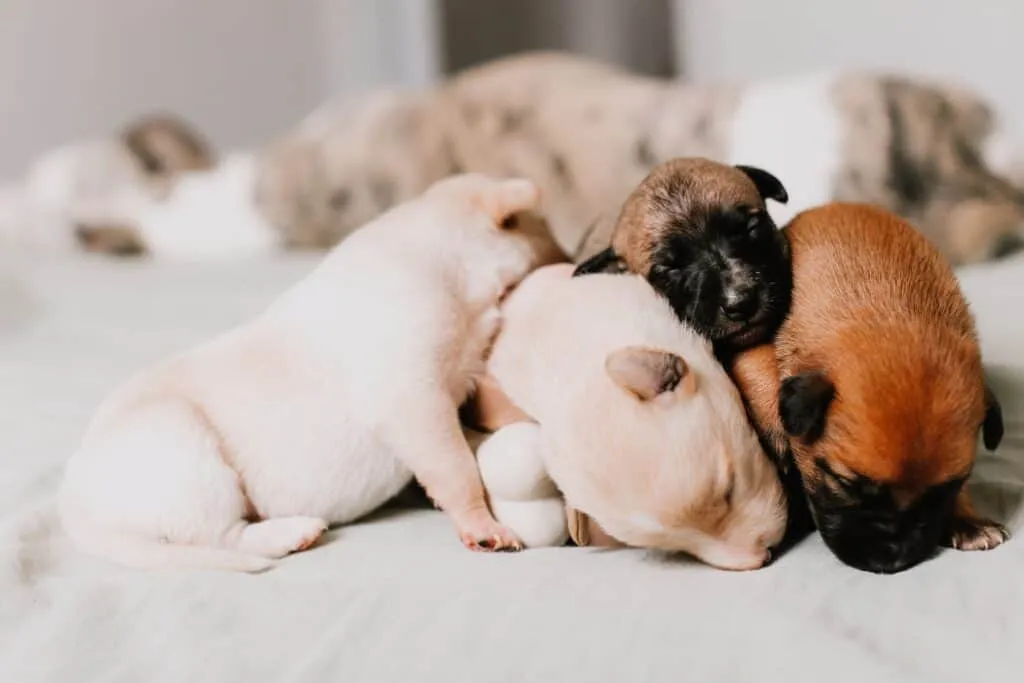
Rubbing the Abdomen
To calm a puppy in pain or distress due to elimination difficulties, give him a tummy massage.
Using your palms or fingers, try rubbing in a gentle, clockwise motion to help activate his bowel motility. Begin by placing your puppy in an upright position. Gently start rubbing the back of his leg. Continue rubbing until his tail begins to rise.
Then, place him on his back and rub his left side for several minutes. As you do so, his anus begins to open so he can poop.
If you notice this encouraging sign, vigorously rub the abdomen downward. If done properly, your dog should relieve himself thereafter.
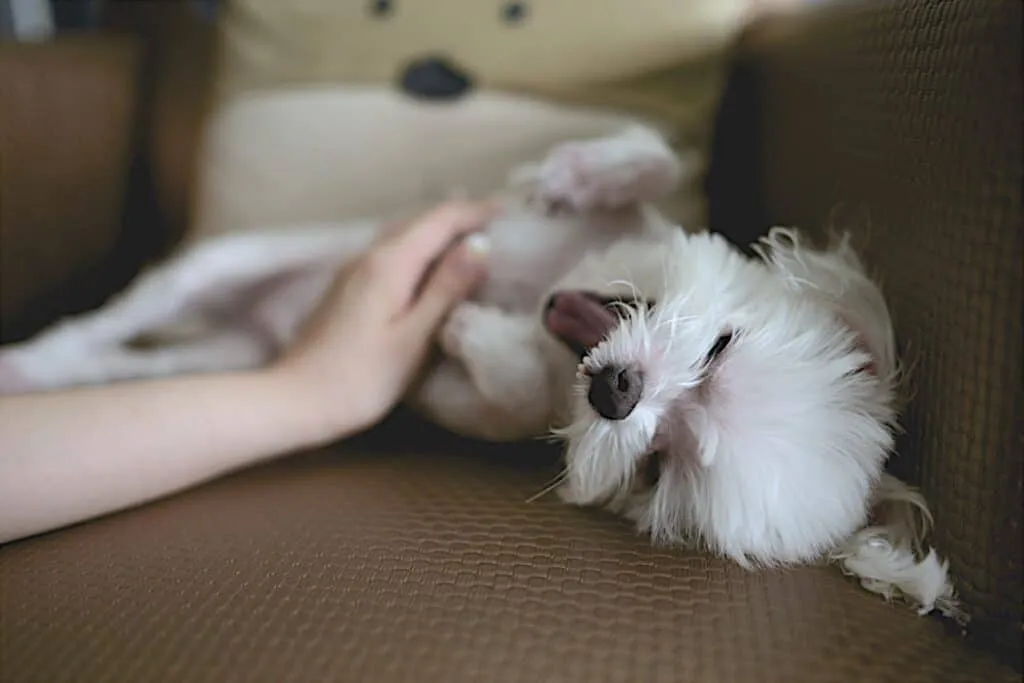
When to Visit the Vet
When you have doubts about the presence of a medical condition in your puppy that affects his potty habit, bring him to the vet immediately.
If your young pup has not defecated or urinated after 24 hours, you should immediately contact your veterinarian. You must consult with him before proceeding with any treatments to help you manage the symptoms and rule out any underlying medical reasons as soon as possible.
It is also crucial to monitor your puppy’s bowel movements each time he goes to the potty and check if his feces’ quantity, color, texture, and smell are all regular or otherwise.
If your dog is in pain or if his elimination is accompanied by vomiting, lose of appetite, or when there are changes to his stool’s texture, consistency, and color, you need to see your veterinarian right away.
Provide her with a good description of the symptoms, the consistency of the stool, the frequency of his unsuccessful attempts to defecate, and your puppy’s diet history.
Ensure your puppy urinates normally, as straining to urinate can sometimes be confused for constipation.
Examination
Your veterinarian may need to perform physical and rectal exams on your puppy to check for masses, strictures, or foreign material. Based on the symptoms and test results, she can diagnose and treat your pet appropriately.
Supplements
Your vet may have a few recommendations based on his diagnosis. In simple cases, he may recommend natural supplements or probiotic chews that can aid in curing your puppy’s constipation.
Ask your vet for what is appropriate, given your dog’s condition.
Vet-approved Laxatives
In other cases, your vet may opt for a quick solution such as a laxative . Make sure to use the appropriate type and amount as advised by your vet.
Note: Veterinary-approved stimulants should not be overused as they may interfere with normal colon function in the long run.

The End Goal (Pun Intended)
After seeing your dog struggle with his defecation problems, we totally understand how heartbroken you would be. We know you desperately searched for solutions.
Hopefully, the valuable information we provided here, such as the various tips on helping your dog poop, what remedy is best for his constipation, and what may prevent its recurrence, has successfully led both of you to the rear end of the potty finish line.
While a magic pill to instantly treat these concerns may not exist, there are ways by which you can help your puppy.
If constipation persists or is severe, take him to the veterinarian for a checkup. It would help to rule out any serious condition as soon as possible.
